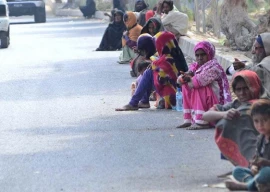
The bench observed that recommendations in this regard needs to be written down after which the matter would be referred to the federal government.
The top court had appointed Makhdoom Ali Khan advocate as amicus over Tatheer Fatima’s request for the top court to allow her to mention the words ‘Bint-e-Pakistan’ i.e. the daughter of Pakistan in place of her father’s name in all her documents.
The amicus submitted that there is no need for the name of father to be displayed on a person’s identification documents as long as such information is available in official records and databases of the authorities.
He said that various amendments to statutory provision and rules would be required to eliminate the requirement of including father’s name in the official documents of children.
“On the other hand, if the requirement to display the father’s name on identification documents is removed, only the forms of identification prescribed under the rules will have to be modified. This, in my opinion, would not be a cumbersome exercise for the relevant authorities,” Makhdoom stated in his written submission.
He further stated that in the present age, identification documents and databases are computerised while CNICs issued by NADRA contain microchips.
“Passports issued by the DG Passports are machine-readable. Persons are identified through thumb impressions, facial recognition technology and retina scans at all major airports in Pakistan and abroad. In my opinion, therefore, there is no need for the name of father to be displayed on a person’s identification documents as long as such information is available in official records and databases of the authorities,” he wrote.
He contended that there were many examples where identification documents do not display the information collected by the authorities. He added that a form mentioning all the details had to be filled in and submitted for a visa application by an applicant but it does not display on visa.
“This is so because as soon as the visa is scanned at the immigration desk, all information supplied by the person becomes available to the immigration officer,” he said.
“In US, UK, Bangladesh, Sri Lanka, Malaysia, Canada, Kenya, United Arab Emirate (“UAE”) and many other countries, the name of the father is not displayed on passports of citizens. In UAE, the name of the father is also not displayed on the driving license,” he added.
The advocate further submitted that in Tatheer Fatima’s case, the whereabouts of her father are known but it is Tatheer who does not want her father’s name to either appear in her official records or displayed on her identification documents. He further contended that from an examination of the statutory provisions and rules, it appears that the inclusion of a person’s father’s name in the official records is mandatory.
“It also appears that the form of identification documents prescribed under the rules include displaying the father’s name (or husband’s name in case of married women) on such documents,” he stated.
Arguing on the interest of the state and fundamental rights of citizens, Makhdoom submitted that seeking and collecting information for records is in the interest of the state.
On the other hand, he contended, it is the duty of the state that no violation takes place of guaranteed fundamental rights such as those of dignity and privacy, the right to life and the right to equality.
“This Hon’ble Court, therefore, must find the balance between the public interest in the State seeking and collecting certain personal information and the right of the individual to insist that he/she has a right to insist that certain personal information be not displayed, disseminated, publicised or circulated,” he contended.
The chief justice observed that the top court cannot order removal of the name of Tatheer Fatima’s father from her documents until and unless amendments are made to the relevant law.
The CJP further observed that the court cannot overlook Shariah in deciding the matters as “it is the supreme law of the country”.
The CJP made these observations when Tatheer Fatima's mother asked the bench to consider her daughter's case from a civic point of view.
Tatheer Fatima claims that she was abandoned by her father who played no role in her life since her birth. She says she was raised by her mother as a single parent and may be permitted to be registered as a citizen of Pakistan without her father’s name appearing in any official record or identification documents. She has prayed for a Supreme Court direction for NADRA and the Director General Immigration and Passports to issue the documents without her father’s name appearing on any such document.
The top court adjourned the hearing for a week.


1729662874-0/One-Direction-(1)1729662874-0-165x106.webp)







1726722687-0/Express-Tribune-Web-(9)1726722687-0-270x192.webp)






COMMENTS
Comments are moderated and generally will be posted if they are on-topic and not abusive.
For more information, please see our Comments FAQ